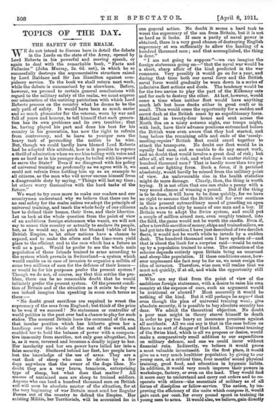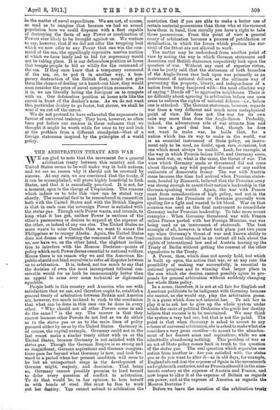TOPICS OF THE DAY.
THE SAFETY OF THE REALM.
WE do not intend to discuss here in detail the debate in the Lords on the state of the Army, opened by Lord Roberta in his powerful and moving speech, or again to deal with the remarkable book, " Facts and Fallacies" (John Murray, 2s. 6d. net), in which he so successfully destroys the argumentative structure raised by Lord Haldane and Sir Ian Hamilton against com- pulsory service. To the book we shall return next week, while the debate is summarised by us elsewhere. Before, however, we proceed to certain general conclusions with regard to the military safety of the realm, we must express our admiration of the untiring patriotism with which Lord Roberts presses on the country what he deems to be the only path of safety. It would have been so much easier and so much pleasanter for the veteran, worn by war and full of years and honour, to tell himself that each genera- tion has its own problems and its own troubles ; that he, having played his part and done his best for his country in his generation, has now the right to refrain from controversy, and to leave to younger men the heavy task of persuading the nation to be wise. But, though we could hardly have blamed Lord Roberts had he adopted this attitude, how is it possible to repress a thrill of admiration when we see him toiling with voice and pen as hard as in his younger days he toiled with his sword to serve the State ? Even if we disagreed with his policy of universal training as profoundly as we agree with it, we could not refrain from holding him up as an example to all citizens, as the man who will never excuse himself from a disagreeable duty by saying, " Things will last my time ; let others worry themselves with the hard tasks of the future."
We want to try once more to make our readers and our countrymen understand why we believe that there can be no real safety for the realm unless we adopt the principle of universal training, and teach the whole body of our citizens how to defend their homes, their lives, and their liberties. Let us look at the whole question from the point of view of an ambitious foreign statesman who wants, we will not say to annex this country or actually to enslave its people, but, as he would say, to prick the bloated bubble of the British Empire, to let other nations have a chance to expand, and to make the effete and the time-worn yield place to the efficient and to the race which has a future as well as a past. Would he prefer to see the whole male population of these Islands trained to arms according to the system which prevails in Switzerland—a system which would enable us in case of invasion to organise a militia of some two millions of men for the defence of their homes— or would he for his purposes prefer the present system ? Though we do not, of course, say that this settles the pro- blem, there can be no reasonable doubt that he would infinitely prefer the present system. Of the present condi- tion of Britain and of the situation as it exists to-day we can indeed imagine him speaking in some such terms as these :— " No doubt great sacrifices are required to wrest the supremacy of the seas from England; but think of the prize to be won if we succeed ! No statesman or controller of world politics in the past ever had a chance to play for such stakes. The moment Britain loses the command of the sea, that insular position which has hitherto given her a handicap over the whole of the rest of the world, and enabled her to hold the balance of power with a compara- tive immunity from sacrifice, not only goes altogether, but is, as it were, reversed and becomes a deadly injury to her. Her insularity and her sea power have lulled her into a false security. Sheltered behind her fleet, her people have lost the knowledge of the use of arms. They are a. vast flock of sheep who can be driven by a few dogs anywhere that the owner of the dogs likes. No doubt they are a very brave, tenacious, enterprising type of sheep, but what does that matter ? All masses of untrained men are sheep to trained soldiers. Anyone who can land a hundred thousand men on British soil will soon be absolute master of the situation, for at the very beginning of war Britain must send her Regular Forces out of the country to defend the Empire. Her existing Militia, her Territorials, will be accounted foi in one general action. No doubt it seems a hard task to wrest the supremacy of the sea from Britain, but it is not so hard as it looks. If once a parity of naval power is obtained, there is a very good chance of destroying English supremacy at sea sufficiently to allow the landing of a hundred thousand men ; and that accomplished, the thing is done."
" I am not going to suppose "—we can imagine the foreign statesman going on—" that the naval war would be a short, sharp affair of the kind predicted in the war romances. Very possibly it would go on for a year, and during that time both our naval force and the British naval force would gradually be worn down in a series of indecisive fleet actions and duels. The tendency would be for the two navies to play the part of the Kilkenny cats and for each to destroy the other. At last, however, would come a time when neither fleet would have anything much left but lame ducks either in great craft or in small. Then would come the opportunity for a sudden and secret dash at the British coast by an expeditionary force. Mobilised in twenty-four hours and sent across the North Sea on a misty autumn night, our troops might, with luck, have their advance positions entrenched before the British were even aware that they had started, and long before the remaining odds and ends of the ' sorely- needing-repairs ' British fleet could crawl together to attack the transports. No doubt our fleet would be in equally bad case, and so unable to do any escort work, and no doubt that would involve a great deal of risk ; but after all, all war is risk, and what does it matter risking a hundred thousand men ? That is hardly more than two per cent. of our fighting force. Such a force, if it perished absolutely, would hardly be missed from the military point of view. An unfavourable rise in the health statistics might do more damage. Clearly, then, the thing is worth trying. It is not often that one can stake a penny with a. very sound chance of winning a pound. But if the thing is to be done, it will have to be done quickly, for we have no right to assume that the British will for ever continue in their present extraordinary mood of guarding an open safe in a crowded city by means of one man and a boy. If Britain were to adopt the Swiss system, and could put a couple of million armed men, even roughly trained, into the field, the game would not be worth the candle. Even if, after a terrible sacrifice of money, ships and trained sailors, we had got into the position I have just described of two derelict fleets, it would not be worth while to invade by a sudden dash. The hundred thousand men I have spoken of—and. that is about the limit for a, surprise raid—would be eaten up by a population trained to arms. The attraction of the scheme depends entirely upon Britain being an unarmed and sheep-like population. If these conditions cease, how- ever unpleasant the fact may be for us, we must resign the idea of invasion. Therefore, wise men will realise that we must act quickly, if at all, and while the opportunity still exists."
Who can say that from the point of view of the ambitious foreign statesman, with a desire to raise his own country at the expense of ours, such an argument would be irrational or absurd? Most assuredly it would be nothing of the kind. But it will perhaps be argue' that even though the plan of universal training woula give absolute security, it is possible to buy absolute security too dear. We admit the theoretical objection. No doubt a poor man might in theory starve himself to death in order to pay too heavy an insurance premium against all accidents. All we can say is that in the case before us there is no sort of danger of that kind. Universal training of the Swiss kind, which is all we propose or desire, would make a comparatively small addition to our expenditure on military defence, and one we could incur without financial ruin. Indirectly, we believe it would prove a most valuable investment. In the first place, it would give us a very much healthier population by giving to our young men, at a critical time, four months' sound physical training, good food, and education in hygienic habits. In addition, it would very much improve their powers in workshops, factory, or even on the land. They would find it more easy to understand and carry out orders and to co- operate with others—the essentials of military as of all forms of discipline or fellow-service. The nation, by im- proving the efficiency of the units which compose it, would gain cent. per cent. for every pound spent in training its young men to arms. It would also, we believe, gain directly In the matter of naval expenditure. We are not, of course, so mad as to imagine that because we had an armed population here we could dispense with a fleet capable of destroying the fleets of any Power or combination of Powers ever likely to be brought against us. We venture to say, however, that if we did not offer the tempting bait which we now offer to any Power that can win the com- mand of the sea, the appallingly expensive marine auction at which we have lately had to bid for supremacy would not be taking place. It is our defenceless position at home that tempts people to bid so wildly for the command of the sea. If they once knew that a temporary command of the sea, or, to put it in another way, a tem- porary destruction of the British fleet, would not give them the chance of dealing us a knock-out blow, they would soon consider the price of naval competition excessive. As it is, we are literally luring the foreigner on to compete with us. Our defenceless position at home acts like the carrot in front of the donkey's nose. As we do not want this particular donkey to go faster, but slower, we shall be wise if we cut off the carrot.
We do not pretend to have exhausted the arguments in favour of universal training. They have, however, so often been put before our readers in these columns that we thought it might be worth while for once to try and look at the problem from a different standpoint—that of a foreign statesman inspired by the principles of a world policy.











































 Previous page
Previous page